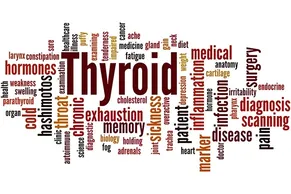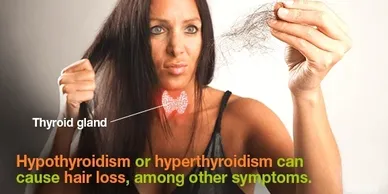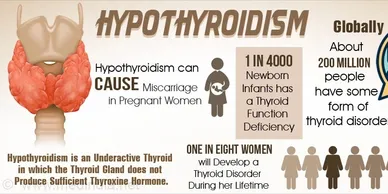Dr. Patil's Diabetes, Thyroid & Hormone Clinic | Dr. Himanshu Patil
Thyroid Care
Know your Thyroid
Thyroid & Hair Fall
Thyroid & Diet

A) What is a thyroid gland?
- The thyroid gland is an endocrine gland in your neck. It makes two hormones that are secreted into the blood: thyroxine (T4) and triiodothyronine (T3). These hormones are necessary for all the cells in your body to work normally.
- The thyroid gland lies in the front of your neck in a position just below your Adam’s apple. It is made up of two lobes – the right lobe and the left lobe, each about the size of a plum cut in half – and these two lobes are joined by a small bridge of thyroid tissue called the isthmus. The two lobes lie on either side of your wind-pipe.
- Thyroid disorders are very common and tend mainly to occur in women, although anybody – men, teenagers, children and babies, too – can be affected. About one in 20 people has some kind of thyroid disorder, which may be temporary or permanent.
B) What does my thyroid gland do?
The Thyroid gland makes hormones which are secretes into the blood stream & influences the activity of all the cells and tissues of your body.
C) What can go wrong with my thyroid?
- Hypothyroidism (underactive thyroid)
- Hyperthyroidism (overactive thyroid).
D) Can thyroid disorders be treated?
Yes – your thyroid disorder and many of the symptoms, too, can be treated. Most thyroid disorders are treated with daily medication.
Thyroid & Pregnancy

- Undiagnosed thyroid disorders can cause fertility difficulties for both men and women, and problems during pregnancy. Once treated, normal fertility returns and you can expect to have a healthy baby.
- It is very important to arrange to have a thyroid function test with your endocrinologist.
It is very important to arrange for a consultation with an endocrinologist, if you have a thyroid disorder or you are diagnosed with a thyroid disorder whilst planning for pregnancy or are already pregnant.
- It is well recognised that thyroid problems often run in families and if family members.
- If you have questions or concerns about your thyroid disorder, you should talk to Dr.Himanshu Patil as he will be best placed to advise you.

A) Introduction
Abnormal hormones are often blamed for loss of scalp hair though, perhaps surprisingly, they are responsible for just a small minority of instances of this distressing symptom. Many different conditions can lead to hair loss; some hair loss is part of normal life. Women after childbirth and at the time of the menopause can lose hair and almost every man will lose some hair by the time of reaching adulthood. Elderly males and females will develop baldness of various degrees, which is largely determined by genetic factors.
B) Hair loss and thyroid disease
- Severe and prolonged hypothyroidism and hyperthyroidism can cause loss of hair. The loss is diffuse and involves the entire scalp rather than discrete areas.
- Regrowth is usual with successful treatment of the thyroid disorder, though it will take several months and may be incomplete.
C) Hair loss associated with autoimmune thyroid disease.
Most people with hypo- or hyper-thyroidism have autoimmune thyroid disease. If a person has one autoimmune disease he/she is more likely than others to develop some other autoimmune condition.
D) What can I done?
Most cases of scalp and eyebrow hair loss caused by thyroid disorders are temporary, but it may take several months for the medication to stimulate your hair to regrow. Try to be patient as regrowth can be unpredictable, and be aware that new hair may differ in texture and colour.
Hypothyroidism

Hypothyroidism is a condition where the thyroid gland produces too little thyroid hormone for the body’s needs. It is also known as an under-active thyroid.
A) Causes
- Autoimmune thyroid disease.
- hyperthyroidism or Cancer.
- Over-treatment of hyperthyroidism .
- A malfunction of the pituitary gland.
B) Common Symptoms
A slowing down of mental and physical processes of the whole body, such as
- Fatigue and tiredness
- Sensitivity to the cold
- Constipation
- Dry skin and hair
- Low mood and mental slowness
- Heavy periods and fertility problems.
C) Diagnosis
- By a physical examination and Blood Test.
D) Treatment
Levothyroxine tablets (a synthetic version of thyroxine) taken daily.
TAKE & APPOINTMENT NOW

There are no specific foods or dietary supplements that are helpful in treating thyroid disorders.
To ensure that you remain as healthy as possible it is important to eat the right variety of foods in the correct proportions. For example, choose low fat, low calorie spread rather than butter or ordinary margarines, avoid high salt intake and cut down on hidden fats & sugars (cakes, biscuits, chocolate).
A) Calcium
Some calcium rich foods and supplements interfere with levothyroxine absorption. A gap of 4 hours between the two would be adequate to ensure there is no significant impact on blood thyroxine levels.
B) Soya
Soya interferes with thyroxine absorption, therefore if you are taking thyroxine you should try to avoid soya.
C) Iodine
we obtain the iodine we need from a normal healthy, balanced diet.
- Too little iodine can result in thyroid swelling (a goitre)
- Too much iodine can be dangerous and cause either under activity of the thyroid (hypothyroidism) or can worsen over active thyroid gland in certain types of hyperthyroidism.
C) Iron Tablets
- Some medications such as iron tablets (ferrous sulphate) can interfere with the absorption of thyroxine.
- We recommend a two-hour interval between taking thyroxine and the iron.
Know your Thyroid

Hyperthyroidism is a condition where the thyroid gland produces too much thyroid hormone for the body’s needs. It is also known as an over-active thyroid.
A) Causes
- Graves’ disease – the most common cause
- A toxic nodular goitre
- A solitary toxic thyroid adenoma
- Thyroiditis.
B) Common Symptoms
A speeding up of mental and physical processes of the whole body, such as
- weight loss, despite an increased appetite
- palpitations / rapid pulse
- sweating and heat intolerance
- tiredness and weak muscles
- nervousness, irritability and shakiness
- mood swings or aggressive behaviour
- looseness of the bowels
- warm, moist hands
- thirst
- passing larger than usual amounts of urine
- itchiness
- an enlarged thyroid gland
If the cause is Graves’ disease, you may also have thyroid eye disease. Smokers are up to eight times more likely to develop thyroid eye disease than non-smokers.
C) Diagnosis
By a physical examination and Blood Tests.
D) Treatment Options
- Antithyroid Drugs
- Surgery to remove all or part of the thyroid gland
- Radioactive Iodine to destroy most of the thyroid tissue
To Consult Endocrinologist Dr. Himanshu Patil.
If You any Question or concern above your Throid Disorders, you should talk to Dr. Himanshu Patil as he will be best person to advise you.
